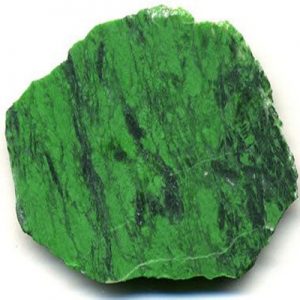Maw-sit-sit
Maw-sit-sit was discovered in Tawmaw, Myitkyina-Mogaung District, Kachin State, Myanmar (Burma) in the early 1960’s near the historic imperial Jadeite mines of northern Myanmar. It is a rock, not a mineral. This means it is composed of several minerals each containing their own mixture of chemicals. It is a chromium-rich metamorphic rock with a vivid green base color mixed with black spots, bands, blotches, and swirls. The dominant mineral is Kosmochlor, a sodium chromium pyroxene, that constitutes about 60% of the Maw-sit-sit mixture. The next ingredient, about 15%, is chromium-enriched Jadeite followed by chromium Ekermannite, about 4%, and chromium Albite at about 1%. The common element in each mineral is chromium which is the strongest influence on the vivid, emerald green color of Maw-sit-sit. It can also contain other mineral impurities or inclusions such as pure chromite, that can be seen as shiny “chrome” looking flecks, and white Natrolite streaks and bands. Maw-sit-sit is always opaque and makes beautiful cabochons, beads, and carvings.
The only source of Maw-sit-sit is still the place where it was discovered, Tawmaw, Myitkyina-Mogaung District, Kachin State, Myanmar (Burma).
| Formula: | NaCr(Si2O6)+Fe,Mg |
| Cleavage: | [110] Good (Kosmochlor) |
| Fracture: | Irregular to Conchoidal |
| Tenacity: | Brittle |
| Hardness (Mohs): | Varies, up to 7.0 |
| Density: | 2.50 – 3.20 (g/cm3) |
| Luminescence: | None |
| Radioactivity: | Not Radioactive |
| Color: | Vivid Emerald Green to Dark Green, with black splotches, swirls and veins |
| Transparency: | Opaque |
| Luster: | Vitreous to Greasy |
| Refractive Index: | 1.52 – 1.74; most commonly around 1.52 |
| Birefringence: | Varies |
| Dispersion: | Moderate to Strong; r > v (Kosmochlor) |
| Pleochroism: | Strong; X = yellowish green; Y = blue-green, grass-green; Z = emerald-green (Kosmochlor) |


